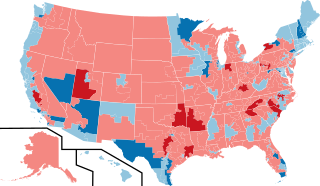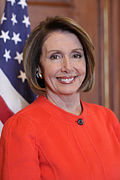
Back انتخابات مجلس النواب الأمريكي 2012 Arabic Wahlen zum Repräsentantenhaus der Vereinigten Staaten 2012 German Εκλογές της Βουλής των Αντιπροσώπων των Ηνωμένων Πολιτειών 2012 Greek Elecciones a la Cámara de Representantes de los Estados Unidos de 2012 Spanish Élections américaines de la Chambre des représentants de 2012 French 2012년 미국 하원의원 선거 Korean Wybory do Kongresu Stanów Zjednoczonych w 2012 roku Polish
| ||||||||||||||||||||||||||||||||||
All 435 seats in the United States House of Representatives[a] 218 seats needed for a majority | ||||||||||||||||||||||||||||||||||
|---|---|---|---|---|---|---|---|---|---|---|---|---|---|---|---|---|---|---|---|---|---|---|---|---|---|---|---|---|---|---|---|---|---|---|
| Turnout | 52.0%[1] | |||||||||||||||||||||||||||||||||
| ||||||||||||||||||||||||||||||||||
 Results: Democratic hold Democratic gain Republican hold Republican gain | ||||||||||||||||||||||||||||||||||
| ||||||||||||||||||||||||||||||||||
The 2012 United States House of Representatives elections were held on November 6, 2012. It coincided with the reelection of President Barack Obama. Elections were held for all 435 seats representing the 50 U.S. states and also for the delegates from the District of Columbia and five major U.S. territories. The winners of this election cycle served in the 113th United States Congress. This was the first congressional election using districts drawn up based on the 2010 United States census.
Although Democratic candidates received a nationwide plurality of more than 1.4 million votes (1.1%) in the aggregated vote totals from all House elections,[3] the Republican Party won a 33-seat advantage in seats, thus retaining its House majority by 17 seats. Democrats picked up 27 previously Republican-held seats, but most of these gains were canceled out due to Republican pick-ups of Democratic-held seats, and reapportionment gains that benefited Republicans, leaving the Democrats with a net gain of just eight seats.[4]
This disparity – common in close elections involving single-member district voting[5] – has sometimes been attributed to targeted Republican gerrymandering in the congressional redistricting process following the 2010 United States Census.[6][7][8][9][10] "Unintentional gerrymandering," --the high concentration of Democrats in urban centers--leading to "wasted votes" in districts that easily elected Democratic candidates, has also been cited as causing some of the efficiency gap.[11][9][12] The GOP also benefited from having a greater number of incumbents, who tend to have an advantage in elections[9] which may have helped Republicans win close elections for individual seats.
In the 20th century, the party with a plurality of the popular vote was unable to receive a majority in the House on four occasions- 1952 and 1996, in which the Republicans held a majority in the House. Meanwhile, the 1914 and 1942 elections were the last time that the Democrats won a majority in the House without winning the popular vote.[8][13]
As of 2023, this is the last congressional election in which the Democrats won a House seat in West Virginia.
Cite error: There are <ref group=lower-alpha> tags or {{efn}} templates on this page, but the references will not show without a {{reflist|group=lower-alpha}} template or {{notelist}} template (see the help page).
- ^ "Federal Elections 2012: Election Results for the U.S. President, the U.S. Senate and the U.S. House of Representatives" (PDF). Federal Election Commission. p. 5. Retrieved December 7, 2015.
- ^ Haas, Karen L (February 28, 2013). "Statistics of the Congressional Election of November 6, 2012". Office of the Clerk of the U.S. House of Representatives. p. 76. Retrieved March 1, 2013.
- ^ Haas, Karen L. (February 28, 2013). "Statistics of the Presidential and Congressional election of November 6, 2012" (PDF). Retrieved May 29, 2013.
- ^ "Under Obama, Democrats suffer largest loss in power since Eisenhower".
- ^ "...the discrepancy between the popular vote won by a party and the seats that party wins in Congress is an endemic feature of our political system." Trende, Sean. Why Republicans Lost the Vote But Kept the House. RealClearPolitics. 2013-05-16. Retrieved 2013-09-15.
- ^ Herdt, Timm (April 17, 2013). "Timm Herdt: Does the GOP now own the House?". Contra Costa Times. Retrieved May 29, 2013.
- ^ Egan, Timothy (May 2, 2013). "House of Un-Representatives". The New York Times. Retrieved May 29, 2013.
- ^ a b Wang, Sam (February 2, 2013). "The Great Gerrymander of 2012". The New York Times. Retrieved May 29, 2013.
- ^ a b c Palmer, Griff; Cooper, Michael (December 14, 2014). "How Maps Helped Republicans Keep an Edge in the House". The New York Times. Retrieved January 29, 2015.
- ^ "GOP gerrymandering creates uphill fight for Dems in the House". PBS NewsHour. March 31, 2014. Retrieved July 4, 2018.
- ^ Sides, John; McGhee, Eric (February 17, 2013). "Redistricting didn't win Republicans the House". The Washington Post.
- ^ "Republicans won more House seats than more popular Democrats, though not entirely because of how districts were drawn". @politifact. Retrieved July 4, 2018.
- ^ "In 1996, House Democrats also won the popular vote but remained in the minority (kind of)". Washingtonpost.com. November 12, 2012. Retrieved December 3, 2012.
© MMXXIII Rich X Search. We shall prevail. All rights reserved. Rich X Search

